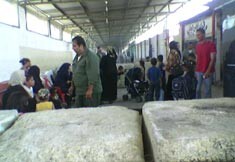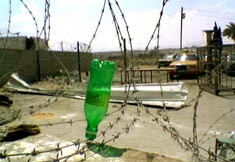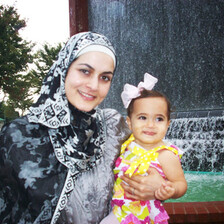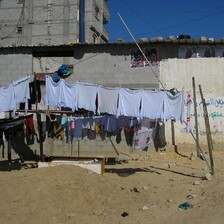

I was invited to attend a reception in Ramallah yesterday by my former scholarship sponsors, the Academy for Educational Development. They said they’d take care of the permit, though no guarantees were made. A few days ago I received word my permit was one of several that were approved. “Congratulations, you’re going to Ramallah.”.
I am excited-it’s been 4 years since I’ve been to Ramallah. Though it is only an hour away, permits are rarely if ever issued to Gazan Palestinians wishing to travel to the West Bank. I call up all my friends, relatives, and colleagues there. I even wonder if I can make it to Jerusalem on Friday.
We leave early, around 7am, from Gaza city. In the van, the other girls I’m traveling with joke, share anecdotes about their time in America.
As we approach Erez, the ruckus dies down, turns into hushed whispers. “What’s that?” asks one girl, who hasn’t been to Erez in several years. “It’s a tank silly”.
We enter Erez, popularly known as the cow pen here for the kilometer long fenced in corridor that passengers must walk through to pass through to the other side. We are forbidden from entering the Israeli side without first receiving approval from the Israelis, via walkie talkie to the Palestinian DCO. It is all part of Gaza’s invisible occupation. We wait, and one hour turns into two, then three, then four.
There are people waiting in different groups, for different reasons. Some wait for approval to enter and visit their loved ones in Israeli jails. Others to receive medical treatment. There also foreign journalists and humanitarian aid workers attempting to make it through to Gaza. Israel has increasingly made this difficult for them. Oftentimes they are denied entry, with the footnote “Its for your own protection”.
As we sit, we discuss Gaza, and the complete hopelessness of people there, that always seemed to be highlighted on borders. One of the girls recalls a caricature in a magazine she read growing up called the “the Crushed Citizen”-a scrawny, balding man, hunched over, head facing the ground, dejected, demoralized. “That’s what we are in Gaza now, crushed citizens” she said. “Completely powerless, hopeless, impoverished-everything is against us.”
A Palestinian officer approaches and calls out names that Israelis have denied entry. “Don’t ask me why you’re permit was refused, it just was. Israelis don’t give reasons, its all in the name of security” he tells the crowd of anxious Palestinians. “Samhiri, Ahmed, Hillis, El-Haddad…”.
“Why am I not surprised?” I tell one of the girls. It’s not the first time I’ve been denied entry to the West Bank. The officer suggests I try to make some inquiries, so I make a few calls, and re-submit my ID card to the Palestinian DCO. The rest of the group is given the go ahead and proceed to the Israeli side, then to Ramallah.
After several more hours of waiting, surrounded by barbed wire, empty cola cans, and in the horizon, the land that I cannot reach, I learn that there is in fact no permit-at least that’s what the Israelis say.
The American who applied on my behalf insists it was approved. “It’s probably their way of justifying your denial of entry, don’t worry about it” she assures me. I call an Israeli friend with some connections. He makes a few calls and ends up with the same answer: there is no permit. “As a Jew, I am sorry for this,” he says.
Exhausted, hungry, and a little bit “crushed”, I return to Gaza. Home sweet home, of 1.5 million crushed citizens.
Leila M. El-Haddad is a journalist based in the Gaza Strip.





